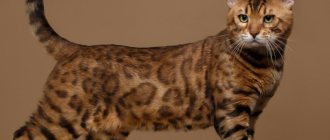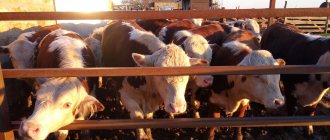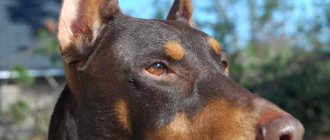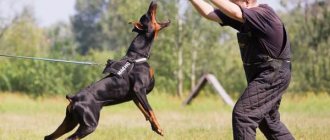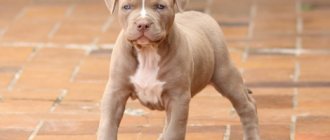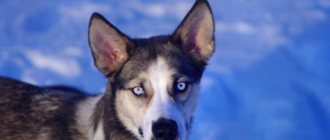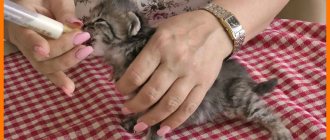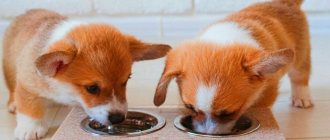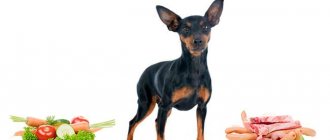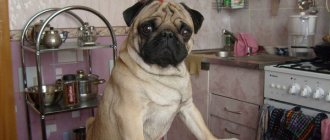General rules
When compiling a diet, the age, weight, general condition, and physical activity of the pet are taken into account.
For water and food, buy enamel or ceramic bowls. Place them on a stand so that your neck is parallel to the floor while eating. Eating from the floor level leads to deformation of the cervical vertebrae and hiccups caused by swallowing air along with food. The height of the stand is adjusted as the animal grows.
The water is changed at least once a day. The bowl of food is placed at a certain time and left for 20 minutes. Uneaten food is discarded and the bowl is removed. It is important to follow a feeding schedule. If the pet has not finished eating within the allotted time for eating or does not show interest in food, the bowl is removed. You can give a little more food at the next feeding.
Naturally fed dogs must be given vitamin and mineral complexes. This is not necessary when feeding dry food.
Feeding pregnant and lactating bitches
During pregnancy and lactation, special attention is paid to nutrition. It is necessary to ensure that the bitch receives the required vitamins and microelements. If she is fed with commercially balanced food for pregnant and lactating women, there is no need to give additional vitamins, milk and meat, otherwise there will be a lot of calcium and vitamin D in the body. This will negatively affect the health of the puppies.
When feeding natural food, the need for vitamins increases, especially in spring. This is very important, otherwise pregnancy and childbirth will be more difficult, and pathologies are possible. When carrying puppies, an exchange of useful substances occurs between the mother's body and the unborn babies.
Shortly before giving birth, the bitch needs to be fed more often, and she should come to the food bowl at any time.
Peculiarities
The growth rate of Dobermans is such that after a year the weight of the animal is 10 times greater than in the first month. Such rapid development requires special attention to the preparation of the pet’s daily diet.
Representatives of the breed are prone to cardiomyopathy and gastrointestinal problems. Gastric bloating and volvulus are more common in males. They are caused by the consumption of large amounts of dry food and other errors in nutrition.
Dobermans suffer from allergies (food, pollen, mold products, etc.). The breed is characterized by weak ligaments and joints. Joint dysplasia (especially hip dysplasia) is common. To reduce the likelihood of their occurrence, a large amount of protein is included in the diet, especially of puppies.
Doberman nutrition
Proper feeding of a Doberman is a science that any owner should master immediately after he has a dog in his house. The nutrition of a Doberman puppy differs from that of an adult dog, and it also differs depending on the period of development of the dog. If you have a very tiny baby, you will probably have a question, what to feed a month-old Doberman puppy ? At the age of one month, puppies are fed up to 6 times a day, the diet should be rich in protein and fiber, and the food should have a soft consistency. Take into account that the puppy digests cow's milk quite poorly. Feeding a Doberman for 5 months is already done less frequently, and the food becomes tougher. The dog's diet should contain a sufficient amount of meat, since it is carnivorous by nature. Don't forget about vegetables, soups and dairy products. The Doberman's diet should be balanced and fortified; it is better to feed the dog at a strictly designated time. Doberman vitamins purchased at a pet store , which can be mixed into the food, will also not be superfluous.
Feeding with natural products
Dobermans should not be given:
- sweets, chocolate. They cause diabetes;
- semolina, pearl barley, corn porridge;
- stewed meat, sausages, semi-finished meat products (dumplings, pancakes, etc.), smoked meats, seasonings. They lead to the development of digestive problems, gastritis;
- pasta and bakery products. They are difficult to digest and can lead to volvulus;
- sharp (tubular) bones (can injure the walls of the larynx or gastrointestinal tract);
- pork in any form and boiled meat;
- grapes, walnuts and pistachio nuts;
- whole milk;
- soups.
Starch is poorly absorbed in the body. Therefore, potatoes are given rarely and in small quantities.
When compiling a diet, the activity of Dobermans is taken into account. To replenish energy, food must be high in calories. At the same time, it is necessary to avoid foods that lead to obesity.
Bones occupy a separate position in nutrition. They should be large and have 50% meat. These can be bird carcasses, necks, backs, wings, ox tails, soft beef/lamb bones, etc.
An important component of the menu is raw muscle meat (veal, beef, rabbit, lamb, etc.). It activates the gastrointestinal tract and strengthens the jaws. It is not recommended to feed the Doberman minced meat. It is rare to feed raw fish.
Offal (heart, liver, kidneys, etc.) is given 1-2 times a week after the age of 6 months. They make up 15% of the diet and are a mandatory element of feeding pregnant and lactating bitches, puppies, and active Dobermans with great physical exertion.
Potatoes, eggplants, avocados, and tomatoes are given occasionally in small portions. You can constantly and unlimitedly give vegetables:
- beets and carrots;
- spinach, zucchini;
- celery;
- pumpkin;
- leaf salad;
- Bell pepper;
- green beans.
Dobermans do not have enzymes to digest fiber. It is recommended to grind the vegetables to a puree. Eggs are given raw and as an omelet. Choose fruits that are not sugary and do not cause allergies.
From fermented milk products - low-fat cottage cheese (5-9% fat), yogurt, kefir. Sweet fruit yoghurts are harmful. They don't give you ryazhenka.
The following greens are added to food: dill, parsley, nettle, alfalfa, flax seeds, dandelion, seaweed flour.
Growing pets need constant vitamin supplementation. They are given to adults seasonally. The best vitamins for Doberman puppies: Royal Canin, Beaphar, Nestle, Unitabs and others.
You can also purchase dietary supplements for dogs that are high in calcium and Glucosamine to strengthen ligaments and bones. Good mineral supplements are “Gelakan” (Slovenia) and “Irishkal” (Holland).
What to feed a Doberman puppy
The BARF puppy diet also consists of raw foods with an emphasis on meaty bones. The puppy is accustomed to variety, giving approximately 6% of its weight per day.
Feeding mode:
- at 4–5 months – 4 rubles. per day;
- from 5 months to a year - three times;
- after a year - 2 times.
The baby should be slightly hungry and not look like a barrel.
Diet in the first month
At this time, the Doberman relies on mother's milk, but in its absence receives a nutritional mixture (100 ml of cow/goat milk + egg). The mixture is diluted with weak tea, heated to +30 degrees, and given from a bottle 9 times a day (with a 6-hour night break) every 2 hours:
- the first 5 days – 100 ml;
- second 5 days – 140 ml;
- third 5 days – 0.2 l;
- from the 16th day - 0.3 l.
After 16 days, the puppy is fed with ready-made milk formulas (no longer than 21 days).
Diet from one month to six months
The meat pulp is cut into pieces . You can use goulash or meat for cutlets, but do not trim or mince (it will slip through before it has time to digest).
During the day the puppy receives:
- at 2 months – 0.2 kg of meat;
- at 3 months – 0.3 kg;
- at 4 months – 0.4 kg;
- in subsequent months - 0.5–0.6 kg.
Important! To strengthen the ligaments, a raw chicken wing is given a day (for 3-4 days, one last phalanx), then the second phalanx, and from 4 months - the whole wing.
With a mixed type of diet (including dry granules), the meat intake is halved. The meat is served with porridge (with the exception of barley and semolina) and stewed vegetables. Frozen vegetables are welcome (they are added at the end of cooking). Porridge is stored in the refrigerator, reheating in portions for each meal.
Diet from six months to a year
After 5 months, give raw tripe (once a week), replacing meat with it, and after six months - beef heart, chicken gizzards and heart. Raw chicken necks won't hurt either. The puppy's menu also includes chicken, turkey, boiled (sea fish), as well as cottage cheese (with 9% fat), into which you can mix porridge and low-fat kefir.
Add a crushed quail egg (with shell) to this lactic acid mixture twice a week. Separate the protein from chicken - it often becomes a food irritant.
What not to feed a puppy
Lungs, udders and beef liver, which often causes diarrhea, are contraindicated for puppies.
Also prohibited:
- sweets, bread and pastries;
- spices and herbs;
- fried foods;
- cabbage, legumes, grapes and plums;
- ketchup and mayonnaise.
Tubular and all boiled bones are unacceptable.
Return to content
Ready-made feed
Dry and wet food (canned food) at home allows you to easily provide your pet with a balanced diet. They are chosen for large breeds of dogs, taking into account the weight and age of the animal. Manufacturers usually indicate this information on the packaging.
The main indicator when choosing dry food for a Doberman is protein in large quantities.
Super premium food contains at least 25% meat. If by-products are included, they must be of high quality and their names must be indicated. They do not contain dyes or artificial flavor enhancers.
Holistics are the best food for large breed dogs. They contain a large amount of meat, vegetables, fruits, and berries. No by-products.
Dobermans are suitable for professional food:
- premium Hills, Royal Canin, Purina Dog Chow, Nutra Gold, Nutra Nuggets, Happe Dog, Brekkies, Diamond, etc.;
- super premium class Eukanuba, Pro Plan, Acana, Orijen, 1st Choice, Trainer, Monge and others;
- holistic - Acana, SAVARRA, Grandorf, ANF Holistic, Summit, etc.
Economy class food should not be given. They do not have enough protein, vitamins and minerals. But it is possible to add dyes, soy, legumes, and other harmful components.
Doberman character
The Doberman will be an excellent watchman and a good friend to its owner. A properly raised Doberman is diligent, intelligent and ready to give all his love to his owner. There is an opinion among people that the Doberman breed is quite nervous and capricious, but this is far from the case. High intellectual abilities give the dog the opportunity to manipulate its owner at any opportunity. However, with proper training, the Doberman is very obedient and will never do anything that its owner might not like. The behavior of a Doberman is a combination of all those qualities that his owner instilled in him since childhood. Nature has rewarded the Doberman with a strong spirit, colossal courage and sharpness of mind. If you need a dog as a home guard, you can choose a Doberman without hesitation. Sensitive by nature, dogs are often used in security agencies and as police dogs. The main task for a person is to model the behavior of Doberman puppies and direct the energy of their pet in the right direction.
Reviews
Vladimir, 35 years old, Vologda
“My “baby” is already 5 years old. At first they fed them natural products. And it fell off the table. They drank problems to the fullest. He was often tormented by diarrhea and vomiting. We went outside and he ate grass. I cleaned my stomach. We fiddled around for a long time. There was no contact from the veterinarian. In the end, the doctor said to transfer him to holistic medicine. What can I say... there were no problems. He eats it with great pleasure. Expensive, of course. But the peace of mind for the whole family is worth it.”
Olga, 43 years old, Kovrov
“I am only for natural food. The children gave me Baron a year ago. I am preparing a large pot for two days. You have to watch both your diet and his. It was difficult at first. Up to a year, you need to especially carefully monitor your diet, adding new foods. It's easier now. The menu is quite monotonous. The main thing is to give meat. Dobermans cannot live without this.”
What to feed an adult Doberman
The serving and its composition depend on the metabolism, age, and activity of your pet . According to the BARF system, the daily volume of food is 2–3% of its weight, that is, a Doberman weighing 40 kg should eat 0.8–1.2 kg of raw food per day. The diet is made heavier (up to 5% of weight) when the dog’s energy consumption is high, with 1/5 of the food coming from vegetables, and 4/5 from meat bones. In spring and early summer, dry yeast is added to the feed as a source of natural vitamins.
Diet from year
Sample menu for an adult Doberman weighing 40 kg.
Morning
- chicken back with bones/skin or 5 chicken necks or 2 turkey necks;
- 100 g of cottage cheese, kefir or yogurt;
- 2 quail eggs;
- 100 g vegetables/fruits (chopped);
- olive or flaxseed oil (1/2 tablespoon).
Evening
- chicken frame;
- liver (80 g);
- chopped vegetables (100 g);
- 100 g homemade cheese or cottage cheese;
- 1/2 tbsp. spoons of oil (from flax/olive).
The diet is supplemented with pieces of overripe fruit, and three times a week - 1/2 tsp. fish oil and dry seaweed.
Diet for older dogs
An aging Doberman is transferred to 3 meals a day, preventing overeating and reducing the calorie content of food . A pet accustomed to drying is fed pellets with a lower percentage of protein (15–21). The health of the musculoskeletal system is supported by chondroprotectors and a course of Decamevit.
After 7 years, bran (a storehouse of fiber) should be included in the menu to enhance intestinal motility. Bran can be mixed with fermented milk and meat foods, but it is preferable with the former: there they swell more efficiently.
What not to feed a Doberman
The restrictions are dictated by the specific structure of the digestive organs. The list of prohibited products includes:
- bones (tubular or heat-treated);
- semi-finished meat products, as well as sausages/sausages;
- millet, corn and semolina;
- confectionery, especially chocolate/sweets;
- legumes, excluding peanuts;
- bread, pasta and pastries;
- acorns, grapes (fresh/dried), walnuts and pistachio nuts.
And, of course, animals should not be fed pickles, smoked foods and spices.
Return to content
